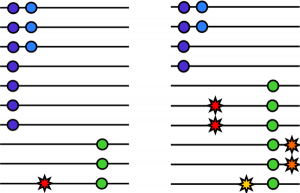 Early last year David Goldstein and colleagues published a provocative paper claiming that many GWAS associations are driven not by common variants of modest effect (the canonical common disease – common variant hypothesis underpinning GWAS) but instead by a local cluster of lower frequency variants that have much bigger effects on disease risk. They dubbed this hypothesized phenomenon “synthetic association” and the term quickly became a genetics buzzword. The paper was widely discussed in both the specialist and mainstream media, and caused quite a stir among academic statistical geneticists.
Early last year David Goldstein and colleagues published a provocative paper claiming that many GWAS associations are driven not by common variants of modest effect (the canonical common disease – common variant hypothesis underpinning GWAS) but instead by a local cluster of lower frequency variants that have much bigger effects on disease risk. They dubbed this hypothesized phenomenon “synthetic association” and the term quickly became a genetics buzzword. The paper was widely discussed in both the specialist and mainstream media, and caused quite a stir among academic statistical geneticists.
That debate has been re-opened today by a set of Perspectives in PLoS Biology: a rebuttal by us (Carl & Jeff) and our colleagues at Sanger, a rebuttal by Naomi Wray, Shaun Purcell and Peter Visscher, a rebuttal to the rebuttals by David Goldstein and an editorial by Robert Shields to tie it all together.